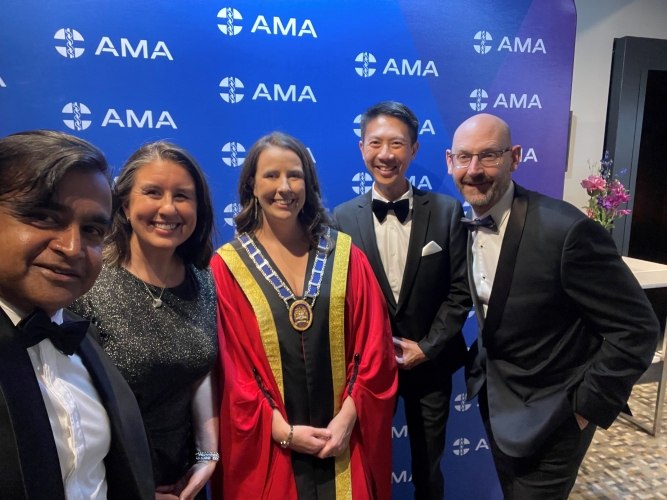President’s Update - Unified advocacy in action
In his latest President’s Update, Associate Professor Peter Subramaniam reflects on the strength of AMA unity at National Conference, the organisation’s growing influence on health policy, and AMA SA’s continued advocacy to address the issues underpinning ramping.

Pictured above: AMA SA President A/Prof Peter Subramaniam, AMA ACT President Dr Kerrie Aust, AMA President Dr Danielle McMullen, AMA Queensland President Dr Nick Yim, AMA Tasmania President Dr Michael Lumsden Steel
Unified advocacy at AMA25
As President of AMA SA for only two months, it was a positive experience to participate in National Conference here in Adelaide at the weekend.
‘NatCon’ was a showcase of AMA knowledge, talent and expertise from across the country. As an organisation that represents doctors of all specialties, in all stages of our careers, from all regions of Australia, ours is an organisation with rare capacity to influence decision-makers.
That status was reinforced by the presence of Federal Minister Mark Butler, who demonstrated our reach when he noted that he and his colleagues had torn the front page from an AMA GP workforce policy document and replaced it with a Labor Party page before releasing it. It was a remarkable acknowledgement of the influence of the AMA and our considered and knowledgeable policy advocacy.
It was clear that NatCon attendees recognise the importance of well-planned advocacy: there was standing room only at the ‘Navigating Influence’ session led by our former President Dr Chris Moy and including CEO Nicole Sykes. Hearing from Lara Giddings, former Premier of Tasmania and now CEO of AMA Tasmania, offered a powerful perspective on advocacy from “the other side” of the table.
As we turn our attention to the March election in South Australia, AMA SA Council will be very carefully strategising our approach to using our influence to call for commitments that promote the interest of doctors in South Australia in service of the patients we treat.
Ramping inquest
Last week, Deputy State Coroner Ian White handed down his findings following a months-long inquest into the deaths of three people who died between 2019 and 2022 after being ramped at either the Royal Adelaide Hospital or Flinders Medical Centre. He found that of the three deaths, one was preventable, a second was ‘potentially preventable’, and the third was not preventable. You can read the full findings here.
The Deputy Coroner made 18 recommendations, including one directed at the Health Minister: ‘that the South Australian government formally acknowledge that ramping is a reality all modern healthcare systems encounter.’ He also pointed out that it would be an ‘error’ to focus solely on preventing ramping if it results in patients being moved from the ramp and placed in worse situations.
‘This approach completely overlooks the overall goal of the Emergency Department and indeed hospitals and the entire healthcare system; namely to take care of people in the safest way possible in the circumstances in which they present,’ he said.
These are important findings and reflect AMA SA’s long-held position on the need to address the root causes of ramping. System design was the focus of our recent Access to Care Round Table on 9 May. The recommendations, developed in collaboration with more than 30 healthcare leaders, are practical and implementable proposals aimed at improving the connection between primary care providers and the acute care sector.
As President, I will continue to advocate for evidence-based policies and planning that ensure South Australia has a sustainable health workforce equipped to meet the increasingly complex needs of the growing and ageing population. You can take a look at some recent media comments I made on this very point.
AMA-SA and public hospital advocacy
I had the opportunity this week to address the CALHN Medical Staff Society headed by AMA member Professor Paul Reynolds. It was an chance to thank medical leadership in our public hospitals and to acknowledge the fact that senior medical staff hold a unique vantage point at the coalface of patient care and system challenges, juggling the responsibilities of their roles while trying hard to influence the direction of healthcare in our state. As a fellow colleague within the eco-system of the largest local healthcare network in South Australia (that often bears the brunt of criticism), I urged my colleagues to join the AMA SA in elevating their insights at the coalface into the broader policy arena.
The AMA SA remains committed to supporting all doctors’ voices – junior and senior - to work together to shape system reforms that are clinically sound, effective and implementable.
As always, I invite you to contact me directly if there are issues that you would like to discuss with me.